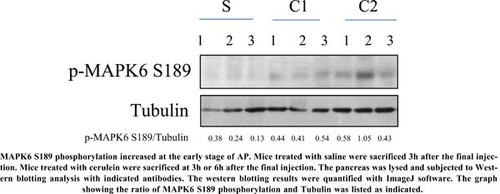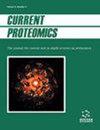Proteomic analysis of early phosphorylated proteins in acute pancreatitis model
IF 0.5
4区 生物学
Q4 BIOCHEMICAL RESEARCH METHODS
引用次数: 0
Abstract
The exact mechanism of acute pancreatitis (AP), which is an inflammation of the pancreas, still remains unclear. In this study, we examined the protein phosphorylation changes during the early stage of AP in mice using proteomic analysis. AP model in mice was constructed using an intraperitoneal injection of cerulein. Blood samples and pancreas were collected at 1, 3, 6, 9h after the final injection (n=3 at each time point). Samples collected 3h after the final injection were separately mixed and named S (saline group) and C1 (cerulein group); samples collected 6h after the final injection from the cerulein group were mixed and named C2. Proteins from S, C1, and C2 were extracted, digested by trypsin, and subjected to LC-MS/MS analysis, bioinformatics analysis, and Western blotting. A total of 549 sites (426 proteins) were upregulated, and 501 sites (367 proteins) were downregulated in C1 compared to S; while 491 phosphorylation sites (377 proteins) were upregulated and 367 sites (274 proteins) were downregulated in C2 compared to S. Motif analysis showed that proline-directed kinase and basophilic kinase had a key role during early AP. During an early AP stage, the cellular distributions of proteins slightly changed. The types of domains changed with the development of AP. Phosphorylation proteins associated with calcium signaling, especially IP3R mediated calcium release, lysosome and autophagosome pathway, pancreatic digestive activation, and secretion, were found to be involved in the development of early AP independent of NF-kB activation. Moreover, the MAPK family was found to have a greater impact at the early stage of AP. We also found differentially expressed phosphorylations of amylase and trypsinogen and increased phosphorylation of MAPK6 S189 in early AP. IP3R mediated calcium release and activation of MAPK family are key events promoting the development of early AP.

急性胰腺炎早期磷酸化蛋白的蛋白质组学分析
急性胰腺炎(AP)是胰腺的一种炎症,其确切机制尚不清楚。在这项研究中,我们使用蛋白质组学分析检测了小鼠AP早期蛋白磷酸化的变化。通过腹腔注射蓝蛋白建立小鼠AP模型。于末次注射后1、3、6、9h采集血液和胰腺标本(每个时间点n=3)。末次注射后3h采集的样品分别混合,命名为S(生理盐水组)和C1(蓝蛋白组);末次注射后6h采集的青蛋白组样品混合命名为C2。提取S、C1和C2蛋白,胰酶消化,进行LC-MS/MS分析、生物信息学分析和Western blotting。与S相比,C1中共有549个位点(426个蛋白)上调,501个位点(367个蛋白)下调;与s相比,C2中491个磷酸化位点(377个蛋白)上调,367个位点(274个蛋白)下调。Motif分析表明,脯氨酸定向激酶和嗜碱性激酶在AP早期起关键作用。在AP早期,蛋白的细胞分布略有变化。结构域的类型随着AP的发展而改变。与钙信号相关的磷酸化蛋白,特别是IP3R介导的钙释放、溶酶体和自噬体途径、胰腺消化激活和分泌,被发现参与早期AP的发展,而不依赖于NF-kB的激活。此外,我们还发现MAPK家族在早期AP中具有更大的影响。我们还发现早期AP中淀粉酶和胰蛋白酶原的差异表达磷酸化以及MAPK6 S189磷酸化的增加。IP3R介导的钙释放和MAPK家族的激活是促进早期AP发展的关键事件。
本文章由计算机程序翻译,如有差异,请以英文原文为准。
求助全文
约1分钟内获得全文
求助全文
来源期刊

Current Proteomics
BIOCHEMICAL RESEARCH METHODS-BIOCHEMISTRY & MOLECULAR BIOLOGY
CiteScore
1.60
自引率
0.00%
发文量
25
审稿时长
>0 weeks
期刊介绍:
Research in the emerging field of proteomics is growing at an extremely rapid rate. The principal aim of Current Proteomics is to publish well-timed in-depth/mini review articles in this fast-expanding area on topics relevant and significant to the development of proteomics. Current Proteomics is an essential journal for everyone involved in proteomics and related fields in both academia and industry.
Current Proteomics publishes in-depth/mini review articles in all aspects of the fast-expanding field of proteomics. All areas of proteomics are covered together with the methodology, software, databases, technological advances and applications of proteomics, including functional proteomics. Diverse technologies covered include but are not limited to:
Protein separation and characterization techniques
2-D gel electrophoresis and image analysis
Techniques for protein expression profiling including mass spectrometry-based methods and algorithms for correlative database searching
Determination of co-translational and post- translational modification of proteins
Protein/peptide microarrays
Biomolecular interaction analysis
Analysis of protein complexes
Yeast two-hybrid projects
Protein-protein interaction (protein interactome) pathways and cell signaling networks
Systems biology
Proteome informatics (bioinformatics)
Knowledge integration and management tools
High-throughput protein structural studies (using mass spectrometry, nuclear magnetic resonance and X-ray crystallography)
High-throughput computational methods for protein 3-D structure as well as function determination
Robotics, nanotechnology, and microfluidics.
 求助内容:
求助内容: 应助结果提醒方式:
应助结果提醒方式:


